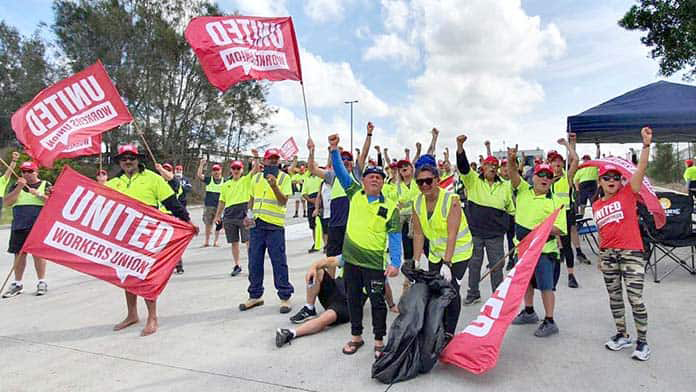United Workers Union (UWU) members at the McCormick Foods manufacturing site in Clayton, south-east Melbourne, Australia, have just started their third week out on strike.
They are locked in a dispute with the company over a new enterprise agreement, to replace the one that expired in 2016 – the last time these workers had a pay rise.
McCormick, a US-based multinational, makes herbs and spices and dipping sauces used by fast-food chains including KFC, Red Rooster McDonald’s, and Hungry Jack’s and also supplies products like Aeroplane Jelly and Keens Mustard to the major supermarkets.
Management not only rejects the UWU’s 3% per annum pay claim, it wants to move away from the 10-hour, four-day per week roster at the Clayton plant to a five-day working week.
The effect of this would be to disrupt the working time arrangements that workers on the Clayton production line have built their lives and family commitments around.
The dispute is in many ways a microcosm of the Covid-19 pandemic’s impact on workers. Many have laboured hard, continuing to front up despite the risk of infection.
Meanwhile, businesses like McCormick have done extremely well: its US parent entity, McCormick and Company, Incorporated, reported a 7.2% increase in gross profits in 2020. This was based partly on a 5% increase in net sales arising from so many more people cooking and eating at home.
But McCormick Foods in Australia does not want to share the spoils with their low-paid manufacturing workforce.
- The Australian Services Union (ASU) has condemned the Federal Government’s replacement for the JobKeeper benefit scheme as ‘welfare for business’.
Emeline Gaske, Assistant National Secretary of the ASU – the largest union representing workers in the aviation industry – said the government’s decision not to tie industry assistance to jobs is a huge mistake which will cost workers and the economy.
‘The whole point of JobKeeper was that money was put into the pockets of workers who need it, and that they remain employed,’ Gaske said.
‘This is the approach the union movement pushed for and it has been hugely successful notwithstanding the number of workers who were excluded from the programme by the government.
‘Without the connection to jobs, or putting money in the pockets of workers who need it, this is just corporate welfare.
‘This is taxpayer money designed to flow into the pockets of businesses, not workers, with no strings attached.’
Even on conservative estimates, more than a quarter of a million jobs will be lost when the government cuts the programme on the eve of Easter and Gaske said the aviation industry would be hard hit.
‘If we allow hundreds of thousands of Australians to fall into the Centrelink queue now, then the collective effort of all Australians to work our way through this pandemic will be largely wasted.
‘The government’s outrageous decision to give money directly to businesses with no requirement to pass the money on to the workforce, or to even keep them employed, means that the industry will take even longer to recover – because we just won’t have the workers we need ready to go as the skies open up.
‘With the opening of state borders and the rollout of the vaccine, airline workers have had hope that they may just get through this crisis. The government has cruelly dashed those hopes by turning its back on the workers and instead giving money to businesses.’
In a recent survey of aviation workers, 78% were reliant on JobKeeper and the vast majority were relying on cash from liquidating assets or deferring bills.
Gaske said the most alarming finding from the research was that 72 per cent said they will not be able to support their families any longer if JobKeeper is withdrawn.
‘Workers in the aviation industry have been hanging on by a thread, many draining their super, selling their homes, and borrowing money to survive. The government is about to cut that thread.
‘Cutting JobKeeper will mean fewer workers, fewer flights, less travel and less money flowing into regional and local economies off the back of domestic tourism.’
The ACTU (Australian Council of Trades Unions) and aviation unions have appealed to the Morrison government to introduce Aviation Keeper to ensure aviation jobs are secured, as well as to implement strict salary capping for executives, banning bonuses and dividends, and ban the outsourcing of jobs overseas.
ACTU Secretary Sally McManus said: ‘The Morrison Government has returned to trickle-down economics, where there are no protections or guarantees for jobs – just hope employers will do the right thing.
‘Almost 90% of aviation workers’ jobs are still affected by the pandemic. We should keep the JobKeeper scheme that has worked very well for the past year and has proven fit-for-purpose. It is the most successful job-saving scheme in our country’s history.
‘This package will not help workers, it contains no obligation on employers to keep workers employed, it won’t even be seen by them. This package will just line the pockets of employers, who’ve proven that they can’t be trusted to use taxpayers’ money to support their employees.
‘Domestic travel is poised to make a comeback. It would give certainty and security to workers, if the Morrison government implemented a full-scale continuation of JobKeeper for industries and sectors where it is still needed, rather than throwing money at some of the best-paid executives in the world.’
